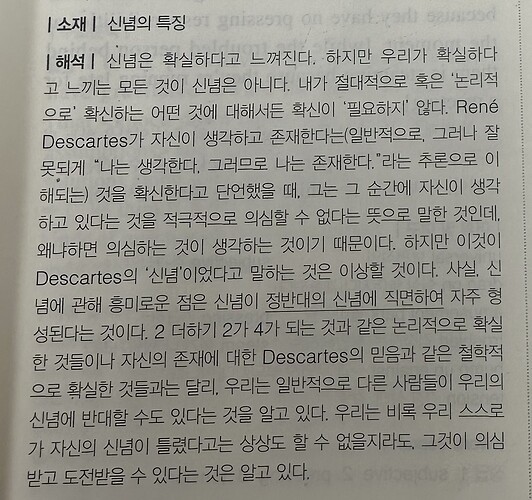전 이 단락이 정말 명료함은 하나도 없는 단락이라고 생각했습니다. 애초에 Conviction이 어떤 맥락으로 쓰였는지도 모르겠고, conviction이 느낀다는 것이 무슨 뜻인지도 모르겠고요. 그럼에도 데카르트이 코기토 논증에 대한 깊은 이해는 있는 것 같아서 개인적으로 혼란스러웠습니다. 글의 기본도 모르는 사람이 데카르트에 그 정도 지식을 갖고 있는 것이 의아했거든요. 그래서 찾아보니 Lynch - Know-it-all Society의 책의 발췌였고, Lynch는 저 단락 전에 conviction이 뭔지, conviction이 feel certain한다는 것이 뭔지 충분히 설명을 하네요:
The poet Ralph Waldo Emerson famously noted that nothing good was ever
achieved without enthusiasm—and, one might add, nothing bad was ever
accomplished without it either. By “enthusiasm” here, Emerson presumably
meant more than just joyful participation; he meant a motivating emotional
commitment to what matters to us. That’s a good approximation of what we
mean by “conviction.” Convictions are the wellsprings of action but the offspring of doctrine.
As any demagogue can tell you, to galvanize voters it
helps to appeal to an ideology—namely, one people can identify with. What
matters is getting voters to go beyond mere belief to total commitment.
This is why there is an emotional component that comes along with
conviction—what we call the “feeling of conviction.” When directed at
something you also believe, it is the feeling of self-confidence. It is a good
feeling. It is good to be right, but it is also good to just feel as if you are right.
That’s why, for those of us worried about the fragile state of democracy, the
old Yeats line still resonates: the “best” are often filled with self-doubt,
while the worst are filled with the passion of conviction.
And it is also why it is important to understand why our convictions form in the first place.
린치에게 conviction이란 우리가 감정적으로 갖고 있는 믿음과 비슷한 걸 뜻합니다. 예를 들어 우리가 정치적인 믿음을 갖고 그것을 밀고 나가게 하는 무언가죠. 그렇기 때문에 우리의 conviction에는 감정적인 부분이 들어가는 것이고, 그때 린치는 "feeling of conviction"이란 구절을 쓰기 시작합니다. 이런 feeling of conviction을 가질 때, 우리는 맞는 이데올로기를 지지한다고 생각하지요. 우리는 그런 면에서 self-confidence가 있는 것입니다. 이 맥락에서 올려주신 단락이 이해돼야합니다. conviction은 단순한 확신이 아닙니다. 단순 확신은 논리적이기만 하면 됩니다. 예를 들어, 2+2 = 4라는 것에 대해 우리는 확신을 갖지만 우리는 2+2=4를 감정적으로 지지하지 않습니다. 이런 의미에서 conviction은, 린치가 말하길, 반대 입장에 맞선다는 것을 아는 것입니다. 우파에 대한 conviction이 있다면 좌파에 맞선다는 것을 인지하고 한 당을 지지하는 것이지만, 논리적인 것은 그렇지 않죠. 논리적인 것은 사실이며, 논쟁의 여지가 없는 것이니깐요. 이런 맥락에서 린치의 conviction과 certainty가 이해돼야하는 것입니다. certainty는 conviction을 포함하지만, conviction이 아닌 논리적 사실도 포함하는 것이지요.
린치란 사람은 잘은 모르지만, 이렇게 보니 잘 써진 글이네요. 근데 앞뒤 맥락 다 잘라먹고 단락 단위로 올려놓으니 정말 무슨 단락인지 모르겠네요. 문제 출제자가 조금 더 문제 출제에 있어서 신중했어야하는 것 같습니다.
데카르트의 방법론적 회의에 있어서는, 당연하게도, <성찰>의 제 1성찰입니다. 짧고 읽기가 그렇게 어렵지는 않습니다. 만일 2차저작이 필요하시다면 Carriero - Between Two Worlds의 첫번째 챕터가 자세하고 좋지요. 또, 조금 어렵긴 하지만, SEP에 Descartes's Method라는 글도 있습니다.
